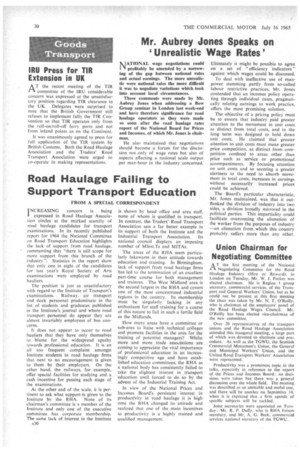Road Haulage Failing to Support Transport Education
Page 32

If you've noticed an error in this article please click here to report it so we can fix it.
FROM A SPECIAL CORRESPONDENT
INCREASING concern is being I expressed in Road Haulage Association circles at the marked scarcity of road haulage candidates for transport examinations. in its recently published report for 1964 the National Committee on Road Transport Education highlights the lack of support from road haulage. commenting that "there is still scope for more support from this branch of the industry ". Statistics in the report show that only one in eight of the candidates for last year's Royal Society of Arts examinations were employed by road hauliers.
The position is just as unsatisfactory with regard to the Institute of Transport's examinations. Railway, air transport and dock personnel predominate in the list of students and graduates published in the Institute's journal and where road transport personnel do appear they are almost invariably employees of bus concerns.
It does not appear to occur to road hauliers that they have only themselves to blame for the widespread apathy towards professional education. It is an all too frequent complaint amongst institute students in road haulage firms that next to no encouragement is given to them by their employers. On the other hand, the railways, for example, offer special facilities for studying and a cash incentive for passing each stage of the examinations.
At the other end of the scale, it is pertinent to ask what support-is given to the Institute by the RHA. None of its chairman's committee is a member of the Institute and only one of the executive committee has corporate membership. The same lack of interest in the Institute
A30 is shown by head office and area staff. none of whom is qualified in transport. In contrast, the-Traders' Road Transport Association sets a far better example in its support of both the Institute and the Industrial Transport Association. Its national council displays an imposing number of Minst.Ts and M1TAs.
The areas of the RHA seem particularly lukewarm in their attitude towards education and training. In Birmingham, lack of support from road haulage firms has led to the termination of an excellent part-time course for both management and trainees. The West Midland area is the second largest in the RHA and covers one of the most concentrated industrial regions in the country. Its membership must be singularly lacking in any enthusiasm for staff training for a course of this nature to fail in such a fertile field as the Midlands.
How many areas have a committee or sub-area to liaise with technical colleges and promote facilities in the area for the training of potential managers? Whilst more and more trade associations are coming to appreciate the vital importance of professional education in an increasingly competitive age and have established education committees. the RHA as a national body has consistently failed to take the slightest interest in transport education until forced to do so by the advent of the industrial Training Act.
In view of the National Prices and Incomes Board's persistent interest in productivity in road haulage it is high time the RHA changed its attitude and realized that one of the main incentives to productivity is a highly trained and qualified management.




























































































































